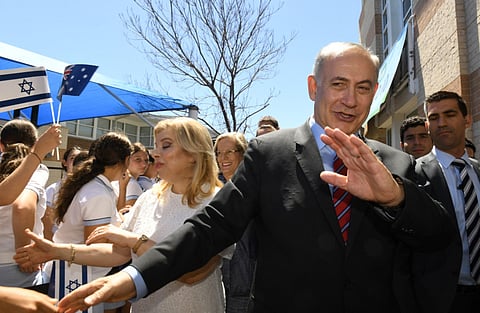No silver lining for the Middle East
Trump has no definite plan yet for the Arab-Israel conflict or how to proceed to solve the almost half-a-century-old Palestinian tragedy

‘I am sure you can hold off on settlements [colonies] for a bit, right Bibi?”, was how United States President Donald Trump casually addressed the complicated issue of Jewish colonies in the Occupied Territories when he met Israel’s Prime Minister Benjamin Netanyahu. Both men were talking to journalists in the White House earlier this month. When Trump talked about Israeli concessions on colonies, he directly addressed Netanyahu when he asked him: “You realise that, right?”. And to make matters worse, when replying to an Israeli reporter’s question about his position on the two-state solution, the American president said: “Two states ... one state, I’d like whatever solution Israel and Palestinians come up with.”
Based on his replies, Trump has, obviously, no definite plan yet for a colony for the Arab-Israel conflict nor how to proceed to solve the almost half-a-century-old Palestinian tragedy. His answer sounded as if he eagerly wanted to get himself off the hook, or relieve himself from an international responsibility. His remarks on the issue reflected the mentality of a businessman rather than the head of the most powerful country on earth. Listening to Trump’s remarks, Netanyahu looked stunned.
In fact, when it comes to the two options — two states or one — Israel’s prime minister is politically in tandem with the mainstream of the Israeli right-wing against both options. Four ministers, at least, in his cabinet are against any form of a state for the Palestinians: Either they remain in the West Bank under full Israeli control, or join an already existing state — Jordan.
Eventually, whatever formula we end up with, whether a two-state solution or a single one, the global community — and particularly the US administration — must guarantee that both people have equal rights under law. However, Trump’s remarks at the press conference have left the international community as well as Netanyahu in a position of unprecedented bewilderment. But, on his part, Israel’s prime minister was clearer and right to the point in his statements. Putting aside totally the option of one-state solution, he explicitly rejected the two-state solution, saying that any solution in his vision will ensure that Israel “retains full control over the entire area to the west of the Jordan River”. In other words, any future Palestinian state, if there is ever going to be one, will effectively remain under “Israeli control”, a phrase that has been used by Netanyahu for the first time.
He previously demanded in recent negotiation with the Palestinian leadership to accept an Israeli military presence in the Jordan Valley, the area separating Jordan from the West Bank. Before that, Netanyahu had accepted a Palestinian state with two conditions: Recognition of Israel as a Jewish state and the so-called Palestinian state be demilitarised.
Therefore, whatever the Trump administration will do in the future, Netanyahu’s government has taken the security demands further by insisting on “Israeli control” over the Jordan Valley in any future agreement with the Palestinians. Effectively, this means ‘yes’ to a Palestinian ‘sate’, but one with no sovereignty whatsoever. In fact, all past Israeli prime ministers since Yitzhak Rabin, internationally recognised as a great peacemaker, wanted some sort of security control west of Jordan River, in order to curb any future state’s sovereignty.
Though the American president tried to sound even-handed when he said in the press conference that both sides will have to make concessions and show some flexibility, he came very hard on the Palestinians as he made several demands from them. He specifically wanted Palestinian to put an end to “the incitement against Israel”, starting from revising school text books as well as “stopping the hate” towards Israel and Jews. Surprisingly, as some Israeli officials and media have noticed, Trump totally ignored a question by an Israeli journalist on his view of the latest rise of anti-Semitism in the US within sections of pro-Trump populist movement.
Interestingly, Trump elaborated on his idea of “concessions”, suggesting Israel might show some flexibility on the idea of a state for the Palestinians within a framework of a regional peace agreement, which will eventually bring Arb League countries into the process that will grant Israel the recognition that it has been asking for. But it is worth noting that Trump is not the first US president who thought of a deal for the Palestinian crisis through a regional effort. Former US presidents from Bill Clinton to Barack Obama had attempted to get Arab countries involved in the peace process, but Israel has consistently refused. This happened after the first time the Palestinians accepted the two-state solution to end the conflict, as proposed by the Palestine Liberation Organisation and the Palestine National Council in 1988. The Palestinians made a historical concession not only by recognising Israel through its 1967 borders, but also accepting a state in just 22 per cent of mandatory Palestine.
Whatever Trump says or does, it is not likely that Israel will now accept the notion of a state for the Palestinians, whatever the size of its territories.
Mustapha Karkouti is a former president of the Foreign Press Association, London. You can follow him on Twitter at www.twitter.com/@mustaphatashe.


